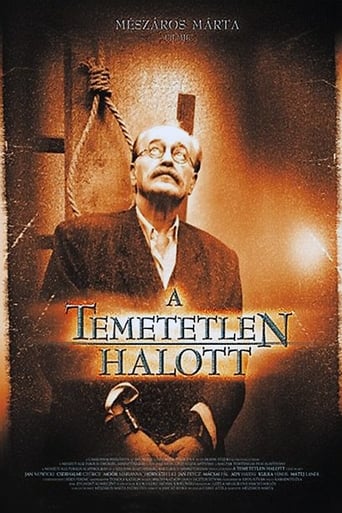SincereFinest
disgusting, overrated, pointless
Livestonth
I am only giving this movie a 1 for the great cast, though I can't imagine what any of them were thinking. This movie was horrible
Mabel Munoz
Just intense enough to provide a much-needed diversion, just lightweight enough to make you forget about it soon after it’s over. It’s not exactly “good,” per se, but it does what it sets out to do in terms of putting us on edge, which makes it … successful?
Staci Frederick
Blistering performances.
Kirpianuscus
a film for memory. and for understand a period in its basic aspects. useful. impressive. necessary. and this fact, the portrait of Imre Nagy, the delicate way to create the realistic portrait of a time are essential virtues. sure, it is not perfect. but it represents a beginning. to remember. to not ignore the legacy of a fight for virtues important more for present than for define the past.a homage. and the desire to use the right tone for show the pieces defining a dark world. for many reasons, it is a good idea to see it.
Armand
it is not a film about a man or a event. it is only picture of a state of mind. nothing else. the silhouette of Nagy Imre, the images, music, acting, tension, accounts of details are pieces of this purpose - authentic picture of a society feelings. so, it is impressive work of a great director about a profound Hungary. a Hungary who can be any other country of Europe under Communism. therefore, the message is so realistic. because the testimony is part of a lot of existences. because courage, sufferance, ideals, need of real values are bones of each society. for me, it is reflection about absurd cruelty of a time.homage to forgotten sacrifices. and subtle warning. or, only a letter from a hero out of every definitions.
isti06
I have just arrived home from the movie so the experience is very recent, but I still don't know what was the director's intention. It was too general to know Nagy Imre's life and too idealized to know the main character's real personality, tells you too few about the revolution of 1956. I had the feeling that Márta Mészáros wants to speak not only about this historical person's fate but also about others who were sentenced and killed after the revolution. But Nagy Imre is not a good sample for this as he was handled specially in the prison as the former prime minister. I think Jan Nowicki played great just like many others in this movie but you may find some very bad performances also. The picture is really beautiful and always match to the actual sequences which change very often and fast.
prsphne
No question this film is visually beautiful, historically authentic and the theme itself is dealt with humanly and with much humility. Jan Nowicki was a truly authentic Nagy Imre and I guess he will be praised much for this role not only in Hungary. However, I find it quite sad that some of the dialogues were extremely constrained and artificial. Mácsai's part is totally unrealistic for instance, not to mention the parts of the grandchildren (brrr...). The whole project is so important to so many in Hungary that Mészáros Márta (an otherwise excellent director) should have had a little more attention in accuracy and authenticity in the dialogues as well. (My feeling is that Jancsó shouldn't have been allowed close to the script.)

